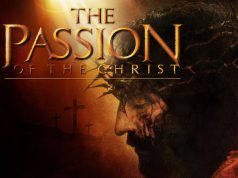
When you’re writing a column about how religion is portrayed in movies, “Monty Python’s Life of Brian” seems like an obvious choice. It is, after all, the satiric story of an ordinary fellow who happened to be born on the same night as Jesus, in the stable down the street, whose life runs parallel to his. But while the film has plenty of jokes that use Christianity as a starting point, what it actually has to say ABOUT religion is pretty simple.
Brian (played by Graham Chapman) is an average Jewish guy living in Roman-occupied Judea in A.D. 33. He has no religious aspirations. The closest thing he has to a “cause” is wanting the Romans to leave town, but that’s political. (In fact, the film’s most trenchant satire is political, not religious.) While Jesus is preaching the Sermon on the Mount, Brian and his mother are standing way in the back, unable to hear, and decide to attend a public stoning instead.
Brian becomes an unwilling messiah when, in an effort to hide from Roman soldiers trying to arrest him, he poses as a street preacher and spouts some nice-sounding platitudes. It’s just an act, but the gathering crowd likes it and decides he’s their savior. Everything he says or does from then on, no matter how insignificant, is perceived as doctrine. His shoe comes off while he’s running; that means his followers should likewise go shoeless.
His attempts to divest himself of followers are futile. “I’m not the Messiah!” he exclaims, exasperated. A disciple replies: “I say you are, Lord — and I should know, I’ve followed a few.”
So is the movie saying that religious devotees are mindless sheep who read too much into the words and deeds of someone who lived a very long time ago? Well, yes — or, at least, it’s saying that SOME are like that. The Pythons themselves had little regard for organized religion, and “Life of Brian” asserts that we should work things out for ourselves rather than blindly follow spiritual leaders.
But that doesn’t mean the movie is entirely opposed to organized religion (even if the writers and performers, in private, were). Taking into account strictly what’s there on the screen, you get a message that is perfectly in harmony with what most religions teach: that the matter of your salvation is ultimately between you and God. You might go to church. You might even believe that your church teaches God’s will more accurately than other churches. But it’s still up to YOU to determine how you think God wants you to live your life. You might be following a path described by preachers and prophets — but you should be following it because you truly believe in it, not because you’ve been taught to do whatever these guys tell you.
The Pythons have some fun with the fractious nature of organized religion. Brian’s followers argue over the meaning of his various meaningless actions, each thinking he or she has it figured out better than the others. The point of that satire is clear, and hard to argue with. How DO you know which interpretation of the Bible is most accurate? The words of Jesus, as recorded in the New Testament, are relatively few, but they often have multiple or obscure meanings. Brian’s followers had Brian right there in front of them and couldn’t suss out his intentions. What hope do we have, 2,000 years later, in understanding Jesus?
It’s important to note one thing about “Life of Brian”: At no point does it make fun of Jesus. Not once is Jesus, or any of his teachings, the butt of a joke. Never. This is significant because the film sparked huge protests and boycotts when it was released, in 1979. (Naturally, the added attention helped make it the fourth highest-grossing film of the year in the U.K., and the highest-grossing British film in the United States.) Religious leaders were shocked and appalled at the blasphemy on display. And yet … there isn’t any.
Jesus is seen only once in the film, preaching the Sermon on the Mount. His dialogue is directly from the Bible. In comedy terms, he’s played “straight.” The humor is in how people react to him — misunderstanding him, getting involved in petty arguments while he’s preaching forgiveness, and so forth. The words of Jesus are the SETTING for the humor, but the JOKES are about other things.
To use an analogy, let’s say I deliver this joke: A duck walks into a bar and asks for a beer. The bartender says, “How are you going to pay for it?” The duck says, “Put it on my bill.”
Now: Is that joke making fun of bars, or bartenders, or ducks, or beer? No. The joke is a simple pun on the multiple meanings of the word “bill.” If you hold bars, bartenders, ducks, or beer to be sacred — and I know some of you do — you should still have no problem appreciating that joke, except insofar as it is lame. It has not mocked anything sacred.
Likewise, in “Life of Brian,” when Jesus says, “Blessed are the peacemakers,” and someone mishears it as “cheesemakers,” that’s not a mockery of Jesus’ sermon. It’s not really a “mockery” of anything. It’s just a silly joke about certain words sounding alike. You could make the case that anything Jesus said is automatically sacred and thus should not even be tangentially related to a joke — shouldn’t even be in the vicinity of a joke — but that’s a hard position to defend. I mean, Jesus used a lot of words. Are they ALL off limits?
It is along those lines that many detractors have their biggest complaint against “Life of Brian”: the crucifixion scene, which ends in a lively musical number called “Always Look on the Bright Side of Life.” Even if you acknowledge that crucifixion was a common Roman punishment, that Jesus was just one of thousands killed that way, and that it’s not Jesus’ crucifixion being depicted in “Life of Brian” … well, isn’t it still taboo? Didn’t the fact of Jesus’ crucifixion, and what it symbolized for Christians, make it no longer just an ordinary Roman execution method but something sacred?
The Pythons bristled at that suggestion. “Any religion that makes a form of torture into an icon that they worship seems to me a pretty sick sort of religion, quite honestly,” said Terry Jones. But he’s dodging the issue. Of course the Pythons knew it was outrageous to make crucifixion into something jolly. That’s why they did it. That’s why it’s funny. If there weren’t widespread reverence for the cross, and for Jesus’ death on it, there would be no impetus to write that scene.
For Christians, “irreverent,” rather than “blasphemous,” might be the best way to describe “Life of Brian.” The members of Monty Python had a jaundiced view of organized religion, but not of Jesus himself. In interviews and commentaries, they’ve discussed how, in writing the film, they had no inclination to satirize Jesus. Some of his followers, sure. Some of the churches that have sprung up in his name, absolutely. But the man himself? As Eric Idle said in “The Pythons Autobiography by the Pythons,” Jesus was “definitely a good guy…. He’s not particularly funny, what he’s saying isn’t mockable, it’s very decent stuff.” John Cleese said, “Quite genuinely I don’t know how you could try to be funny about Jesus’ life, there would be no point in it. What is absurd is not the teachings of the founders of religion, it’s what followers subsequently make of it. And I was always astonished that people didn’t get it.”
— Cinematical




